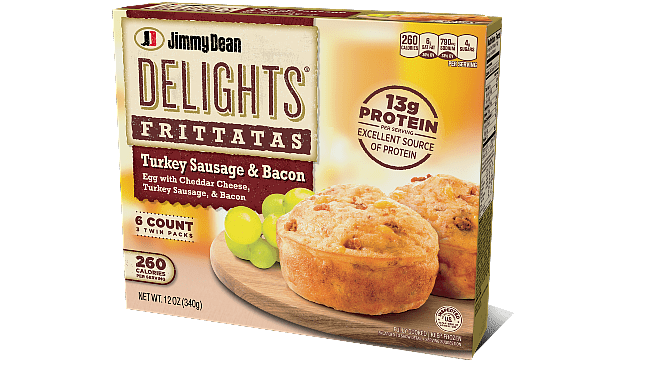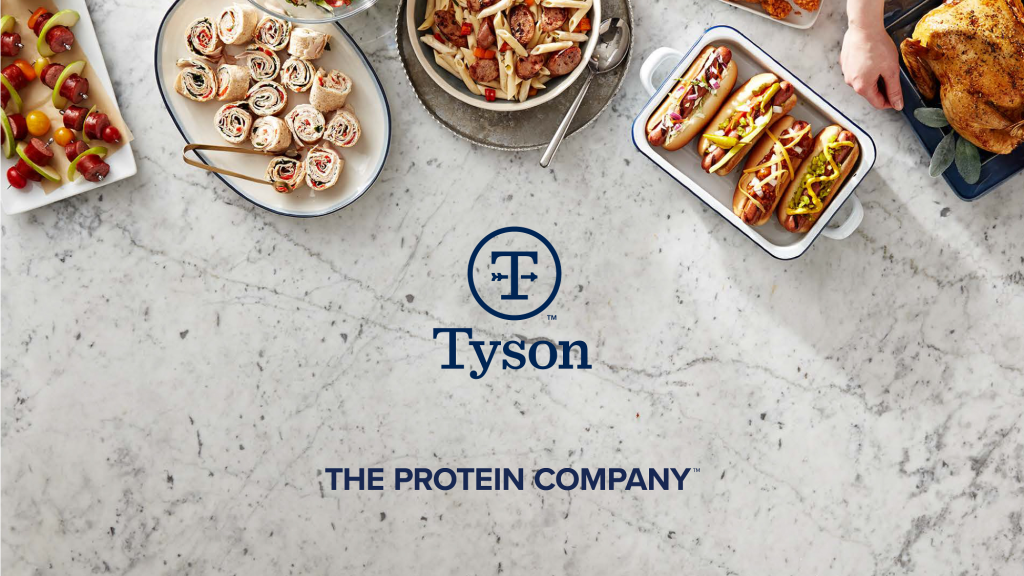Tyson Foods is more than just a chicken company; it’s a global leader in the protein industry, providing a diverse portfolio of brands and products that nourish and sustain millions around the world. From humble beginnings in 1935, the company has grown to become a titan of the food industry, employing over 137,000 passionate team members across the globe.
Tyson Foods stands tall as the second-largest processor and marketer of chicken, beef, and pork worldwide, just behind JBS S.A. It holds the impressive title of being the top U.S. exporter of beef, annually sending more of this protein around the globe than any other company. Together with its subsidiaries, Tyson Foods oversees a portfolio of well-known food brands, including Jimmy Dean, Hillshire Farm, Ball Park, Wright Brand, Aidells, and State Fair. In 2020, its remarkable reach and strong performance earned it the 79th spot on the prestigious Fortune 500 list, solidifying its standing as one of the largest corporations in the United States based on total revenue.
A Legacy of Innovation and Growth:
Founded by John W. Tyson in Springdale, Arkansas, Tyson Foods has always embraced innovation and continuous improvement. From pioneering new processing technologies to diversifying its brand portfolio, the company has consistently adapted to meet the evolving needs of consumers. This dedication to innovation has fueled its impressive growth, transforming it from a regional poultry producer to a global leader in protein.

Beyond Chicken: A Diverse Portfolio of Brands:
While chicken remains a cornerstone of Tyson Foods’ business, the company has strategically expanded its portfolio to include a variety of protein options. Today, Tyson Foods offers a diverse range of brands, including:
- Tyson®: The flagship brand, offering a wide range of fresh and frozen chicken products.
- Jimmy Dean®: A leading brand of breakfast sausage and other breakfast products.
- Hillshire Farm®: A beloved brand known for its premium deli meats and sausages.
- Ball Park®: A household name synonymous with high-quality hot dogs.
- Oscar Mayer®: A iconic brand offering a variety of cold cuts, hot dogs, and other meat products.
- Tyson Fresh Meats®: Providing a wide selection of fresh beef, pork, and lamb.
- Golden Krust Caribbean Bakery®: A popular brand offering delicious Caribbean-inspired baked goods.

Commitment to Sustainability and Social Responsibility:
Tyson Foods recognizes its responsibility as a global leader and is committed to operating sustainably and ethically. The company has implemented various initiatives to reduce its environmental footprint, promote social responsibility, and support the communities in which it operates. These initiatives include:
- Reducing greenhouse gas emissions: Tyson Foods has set ambitious goals to reduce its greenhouse gas emissions and has implemented various programs to achieve these goals.
- Responsible sourcing: The company is committed to sourcing its ingredients responsibly and ethically, working with suppliers who share its commitment to sustainability and social responsibility.
- Community engagement: Tyson Foods actively supports communities through various programs and initiatives, focusing on areas such as hunger relief, education, and youth development.
Leading the Way in the Future of Food:
Tyson Foods is constantly looking ahead, exploring new technologies and innovations to shape the future of the food industry. The company is investing in areas such as plant-based protein alternatives, robotics and automation, and data analytics to continue providing consumers with delicious, nutritious, and sustainable protein options.
With its rich legacy, diverse portfolio, and commitment to sustainability and social responsibility, Tyson Foods is positioned to continue leading the protein revolution and providing nutritious food for generations to come.
Marketing Strategies of Tyson Foods
Tyson Foods is a leading food processing company that operates in multiple segments, including chicken, beef, pork, and prepared foods. The company has a strong presence in the global market and employs various marketing strategies to maintain its position. Here are some of the key marketing strategies employed by Tyson Foods:
1. Branding
Branding is a crucial marketing strategy for Tyson Foods, as it enables the company to differentiate itself from competitors and establish a strong identity in the market. Tyson Foods invests significantly in creating and maintaining a robust brand portfolio, which includes well-known names such as Tyson, Jimmy Dean, Hillshire Farm, Ball Park, and Wright. Each brand under the Tyson Foods umbrella has its unique personality, tone, and messaging, carefully crafted to resonate with specific customer segments. For instance, the Jimmy Dean brand is positioned as a convenient and delicious breakfast solution for busy families, while the Hillshire Farm brand focuses on providing high-quality, farm-to-table meats.
To reinforce its branding efforts, Tyson Foods consistently implements various marketing tactics. For example, the company uses catchy slogans and jingles, such as “Jimmy Dean, Jimmy Dean,somethin’ to eat!” to create memorable associations with its brands. Additionally, Tyson Foods invests in visual identity, packaging design, and advertising campaigns that showcase the quality, taste, and convenience of its products. The company also partners with celebrity chefs and influencers to endorse its brands and create engaging content that resonates with its target audiences. Through these efforts, Tyson Foods builds brand awareness, customer loyalty, and ultimately drives sales across its diverse portfolio of products.
2. Product Development
Tyson Foods leverages product development as a powerful marketing strategy to solidify its position as a leader in the protein industry. Their “culinary innovation network,” including 19 test kitchens and a 39,000-square foot pilot plant, fuels the creation of exciting new products that cater to evolving consumer preferences. This strategy delivers several key benefits:
By consistently introducing innovative products like Tajin-spiced meatballs, smoked sausage with mango, and Jimmy Dean Delights® Frittatas, Tyson Foods taps into new market segments and attracts customers seeking unique flavor combinations and convenience. This fuels volume growth, exceeding market expectations and solidifying their market share.

Creating innovative products builds excitement and demonstrates Tyson Foods’ commitment to staying ahead of the curve. This reinforces the company’s image as a forward-thinking leader in the food industry, attracting talent and fostering brand loyalty among consumers.
Developing new products allows Tyson Foods to diversify its portfolio beyond traditional offerings like chicken, beef, and pork. This expansion into prepared foods like breakfast sandwiches and fresh meal kits opens up new revenue streams and caters to the growing demand for convenient and healthy meal solutions.
With ambitious plans to open 12 new plants and increase capacity by 1.3 billion pounds over the next two years, Tyson Foods demonstrates its commitment to product development as a core driver of its marketing strategy. This ongoing focus on innovation ensures the company remains a leader in the ever-evolving food industry.
3. Partnerships and Collaborations
Tyson Foods leverages strategic partnerships and collaborations as a key marketing strategy to drive growth, innovation, and market access. By teaming up with diverse entities like Tanmiah Food Company, Protix, and Plug and Play, Tyson Foods unlocks several strategic benefits.
Partnerships like the acquisition of Tanmiah Food Company provide Tyson Foods with a foothold in new markets, expanding their global reach and unlocking access to new customer segments. This strategic move allows them to adapt offerings and cater to local preferences, driving further growth and market share.
Collaborations like the one with Protix enable Tyson Foods to tap into cutting-edge technologies and explore sustainable solutions for protein production. This partnership facilitates the development of innovative products that meet growing consumer demands for environmentally conscious food options.

Collaborating with start-up incubators like Plug and Play and 1871 fosters connections with emerging talent and innovative ideas. This strengthens Tyson Foods’ position as a leader in the food industry and opens doors to potential future partnerships and acquisitions.
By supplying chicken to major chains like KFC, Taco Bell, and McDonald’s, Tyson Foods builds strong relationships with key customers and ensures consistent supply to large consumer bases. This strengthens their position within the food supply chain and guarantees increased brand visibility and product availability.
Through strategic partnerships and collaborations, Tyson Foods fuels its growth, fosters innovation, and strengthens its position within the global food industry. This multifaceted approach ensures the company remains at the forefront of the market, adapting to changing consumer trends and solidifying its place as a leader in the protein industry.
4. Retail and Distribution Channels
Tyson Foods strategically leverages a diverse network of retail and distribution channels to reach consumers and drive sales. Their four primary channels – retail, foodservice, international, and industrial and other – provide comprehensive coverage and cater to various customer segments.
- Extensive Retail Presence: From club stores and grocery stores to discount stores and convenience stores, Tyson Foods ensures its products are readily available to consumers. This widespread retail presence increases brand visibility and encourages impulse purchases, leading to increased sales and market share.
- Tailored Solutions for Foodservice: Tyson Foods caters to the specific needs of foodservice businesses by offering various portion sizes and specialized products. Additionally, their distribution centers effectively reach restaurants, hotels, and other foodservice establishments, ensuring timely deliveries and streamlined operations.
- International Expansion and Diversification: Recognizing the growing global demand for protein, Tyson Foods actively expands its international presence. This diversification mitigates risks associated with single-market reliance and unlocks new growth opportunities in emerging markets.
- Efficient Distribution Network: Supported by a robust cold-chain distribution network, Tyson Foods maintains product quality and freshness throughout the supply chain. This network, comprising multiple strategically located distribution centers, ensures efficient delivery and timely restocking, guaranteeing product availability for consumers.
Recognizing the increasing importance of e-commerce, Tyson Foods utilizes online platforms and social media campaigns to reach a wider audience and drive online sales. This digital presence allows them to connect directly with consumers, engage in targeted marketing, and adapt to evolving consumer buying behaviors.
Through its robust and diversified retail and distribution channels, Tyson Foods effectively delivers its products to consumers around the world. This strategic approach, coupled with its commitment to innovation and digitalization, ensures the company remains a leader in the protein industry and continues to deliver value to consumers worldwide.
5. Digital Marketing
Tyson Foods recognizes the power of the digital landscape and actively implements various digital marketing strategies to reach and engage consumers. Here are two key areas where they excel:
Engaging with Influencers: Tyson leverages influencer marketing to tap into the reach and trust established by popular personalities. Partnering with relevant influencers for targeted social media campaigns allows them to connect with specific customer segments and generate brand awareness. The success of their two influencer campaigns, reaching over 10 million people and sparking significant engagement, demonstrates the effectiveness of this strategy.
Optimizing the Digital Shelf: Tyson utilizes cutting-edge artificial intelligence technology to optimize the presentation of its products on online platforms. By employing Vizit’s technology, they gain valuable insights into consumer preferences and visual elements that resonate most effectively. This enables them to customize product presentation and increase online discoverability, ultimately driving sales through the “digital shelf.”
Beyond these specific examples, Tyson Foods employs other effective digital marketing strategies:
- Creating engaging food blogs: Sharing recipes, cooking tips, and food-related content through blogs attracts culinary enthusiasts and builds brand affinity.
- Social media engagement: Utilizing platforms like Facebook and Instagram to post appealing content, host events, and run contests fosters direct interaction with consumers and generates buzz around Tyson products.
- Paid advertising: Leveraging platforms like Google Ads allows Tyson to reach a broader target audience with targeted ads, ensuring their products appear on relevant searches and driving online traffic.
- Instagram Stories: Utilizing this platform’s dynamic nature to showcase products, offer behind-the-scenes glimpses, and engage with followers in real-time creates an interactive and engaging experience for consumers.
Through these diverse digital marketing strategies, Tyson Foods effectively connects with consumers, builds brand awareness, and drives online sales. Their embrace of innovation and willingness to experiment with new tactics ensures they remain at the forefront of digital marketing within the food industry.
6. Advertising
Tyson Foods actively utilizes advertising as a key strategy to build brand awareness, drive sales, and stay ahead of the competition. Their approach encompasses a diverse range of methods tailored to specific audiences and platforms.
Strategic Use of Premium Ad Units: Tyson invests in premium placements across 250 leading media platforms, ensuring their brand messages are seen by a wide audience on prominent websites and apps. This strategy maximizes visibility and drives brand awareness, leading to increased recognition and recall among consumers.
Data-Driven Targeting with Interest-Based Advertising: Tyson utilizes data collected across various platforms to deliver highly personalized ads. This allows them to target consumers based on their specific interests and behaviors, increasing the relevance of their advertising messages and driving engagement.
Engaging Consumers with Mobile Advertising: Recognizing the growing importance of mobile devices, Tyson runs targeted mobile campaigns that leverage location data, offer deals, and provide product information. This strategic approach reaches consumers on-the-go and encourages immediate action, whether it’s visiting a store or making a purchase online.
Tyson employs a multi-faceted approach, leveraging social media platforms for organic and paid advertising, as well as in-store promotions to further engage customers and amplify their brand message.
With a dedicated budget of $339 million invested in advertising in 2023 alone, Tyson Foods demonstrates their commitment to this essential marketing strategy. By diversifying their advertising methods and leveraging data-driven insights, they effectively reach target audiences, build brand loyalty, and drive sales across their diverse portfolio of products.
Through its strategic implementation of diverse marketing strategies, Tyson Foods has established itself as a leading force in the global protein industry. From investing in product development and embracing innovation to leveraging strategic partnerships and building a robust distribution network, Tyson Foods has consistently adapted to evolving consumer preferences and market trends. Their commitment to digital marketing allows them to engage directly with consumers and build lasting brand loyalty, while their strategic advertising ensures maximum visibility and brand awareness. By continuously exploring new opportunities and remaining at the forefront of the industry, Tyson Foods is poised to achieve sustained growth and leadership in the years to come.
Marketing Mix of Tyson Foods
Tyson Foods has carved its success through a dynamic and multifaceted marketing mix. This blend of strategies, encompassing product, price, place, and promotion, forms the bedrock of their competitive advantage and contributes significantly to their sustained growth and market leadership. From meticulously crafted product development to meticulously planned pricing strategies, Tyson Foods orchestrates each element of the marketing mix with precision and intent, ensuring they remain at the forefront of a rapidly evolving industry.
1. Product
Product is a critical element of the Marketing Mix for Tyson Foods, as it encompasses the entire range of goods and services offered by the company. Tyson Foods’ product portfolio includes a wide variety of processed meat products, such as chicken, beef, pork, and turkey, as well as prepared foods like frozen dinners, sandwiches, and soups. The company’s product line caters to different tastes, dietary needs, and lifestyles, with options ranging from traditional meat products to antibiotic-free and plant-based alternatives.
Tyson Foods constantly innovates and updates its product offerings to stay ahead of consumer trends and preferences. For instance, the company has introduced new lines of organic, natural, and grass-fed meat products to appeal to health-conscious consumers. Additionally, Tyson Foods has expanded its portfolio to include non-meat products, such as vegetarian and vegan options, to cater to the growing demand for plant-based foods. By offering a diverse range of products, Tyson Foods can appeal to a broad spectrum of consumers and maintain its position as a leader in the food industry.
2. Pricing
In the complex world of marketing, pricing stands out as the crucial element that directly influences a company’s profitability. For Tyson Foods, navigating the price spectrum requires a multifaceted approach, encompassing diverse strategies tailored to specific products and market dynamics.
Premium Pricing for Value-Added Products:
Tyson Foods recognizes that some customers place a premium on quality and convenience. For such products, they employ a premium pricing strategy. This approach involves charging a higher price, typically 20% above the average category price, to reflect the added value offered. This strategy is particularly effective for products like their premium chicken cuts or prepared meals, where consumers are willing to pay more for perceived benefits like superior taste, convenience, or unique recipe formulations.
Value-Based Pricing for Unique Offerings:
Understanding that some products stand alone due to their unique characteristics and limited competition, Tyson Foods utilizes a value-based pricing strategy. This approach focuses on setting a price based on the perceived value the product delivers to consumers, rather than solely relying on cost considerations. This strategy is well-suited for innovative products like their plant-based protein alternatives or premium meat cuts, where the lack of direct competitors allows for a higher price point justified by the product’s novelty and distinct attributes.
Cost-Based Pricing for Competitive Markets
In markets characterized by intense competition and limited product differentiation, Tyson Foods employs a cost-based pricing strategy. This approach prioritizes maintaining profitability by setting a price that covers production and distribution costs while remaining competitive within the prevailing market price range. This strategy is often used for staple products like chicken breasts or ground beef, where consumers are primarily driven by price and differentiation is minimal.
By employing a diverse mix of pricing strategies, Tyson Foods effectively navigates the complex pricing landscape. Their ability to tailor their approach based on product characteristics and market dynamics ensures that they set prices that optimize profitability, appeal to target customers, and remain competitive within the ever-evolving protein industry.
3. Place
Place refers to the distribution channels used by Tyson Foods to get its products into the hands of consumers. The company relies on a vast network of distributors, wholesalers, and retailers to make its products available in grocery stores, supermarkets, convenience stores, and other outlets across the United States and internationally. Tyson Foods also sells its products directly to restaurants, hospitals, schools, and other institutional customers. Recently, the company has been expanding its e-commerce capabilities, allowing consumers to purchase its products online through various platforms, such as AmazonFresh and Instacart.
To ensure efficient and cost-effective distribution, Tyson Foods has implemented various logistics and transportation systems. The company operates a fleet of refrigerated trucks and trailers to transport its perishable products, and it has implemented a just-in-time delivery system to minimize inventory costs and maximize freshness. Tyson Foods also uses data analytics and machine learning algorithms to optimize its supply chain and distribution networks, ensuring that products are delivered to the right place at the right time. For example, the company launched a pilot project using artificial intelligence to predict demand and adjust production schedules accordingly, reducing waste and improving efficiency.
In addition to its traditional distribution channels, Tyson Foods has been exploring alternative ways to reach consumers. The company has partnered with meal kit delivery services like Chef’d and Blue Apron, offering pre-portioned ingredients and recipes featuring Tyson Foods’ products. Tyson Foods has also launched its own direct-to-consumer platform, called Tyson Fresh, which allows consumers to order fresh meat and poultry products online and have them delivered straight to their homes. By embracing omnichannel distribution, Tyson Foods can reach a wider audience and provide greater convenience to its customers, ultimately driving sales and strengthening its market position.
4. Promotion
Promotion refers to the methods used by Tyson Foods to communicate with its target audience and persuade them to buy its products. The company employs a variety of promotion strategies, including advertising, sales promotions, personal selling, public relations, and digital marketing.
Another significant aspect of Tyson Foods’ promotion strategy is its use of influencer marketing. The company partners with popular social media influencers and bloggers to promote its products and engage with their followers. For example, Tyson Foods collaborated with fitness influencer and actor, Dwayne “The Rock” Johnson, to promote its protein-rich products. The company also runs contests and sweepstakes on social media platforms to encourage user engagement and increase brand awareness.
In addition to traditional promotion methods, Tyson Foods has been experimenting with emerging technologies to reach its target audience. The company has incorporated augmented reality (AR) technology into its marketing efforts, allowing consumers to interact with its products in new and innovative ways. For instance, Tyson Foods created an AR experience that enabled users to virtually try on a pair of wings made from its chicken strips. The company also utilizes chatbots and voice assistants to engage with consumers and provide them with product information and recipe ideas. By leveraging cutting-edge technologies, Tyson Foods can differentiate itself from competitors and effectively reach a younger generation of consumers who crave interactive and immersive experiences.
As the protein industry evolves, so too will Tyson Foods’ marketing mix. Their commitment to innovation and adaptability ensures they are well-positioned to cater to emerging consumer preferences and market trends. By continuously experimenting with new approaches, embracing digital transformation, and fostering a culture of data-driven insights, Tyson Foods will continue to refine and optimize their marketing mix, solidifying their position as a global leader in the protein industry for years to come. Their unwavering focus on consumer value, strategic execution, and a dynamic marketing mix paves the way for continued success in a rapidly changing landscape, ensuring they remain the protein provider of choice for generations to come.
Also Read: Marketing Strategies and Marketing Mix of Walgreens
To read more content like this, subscribe to our newsletter



